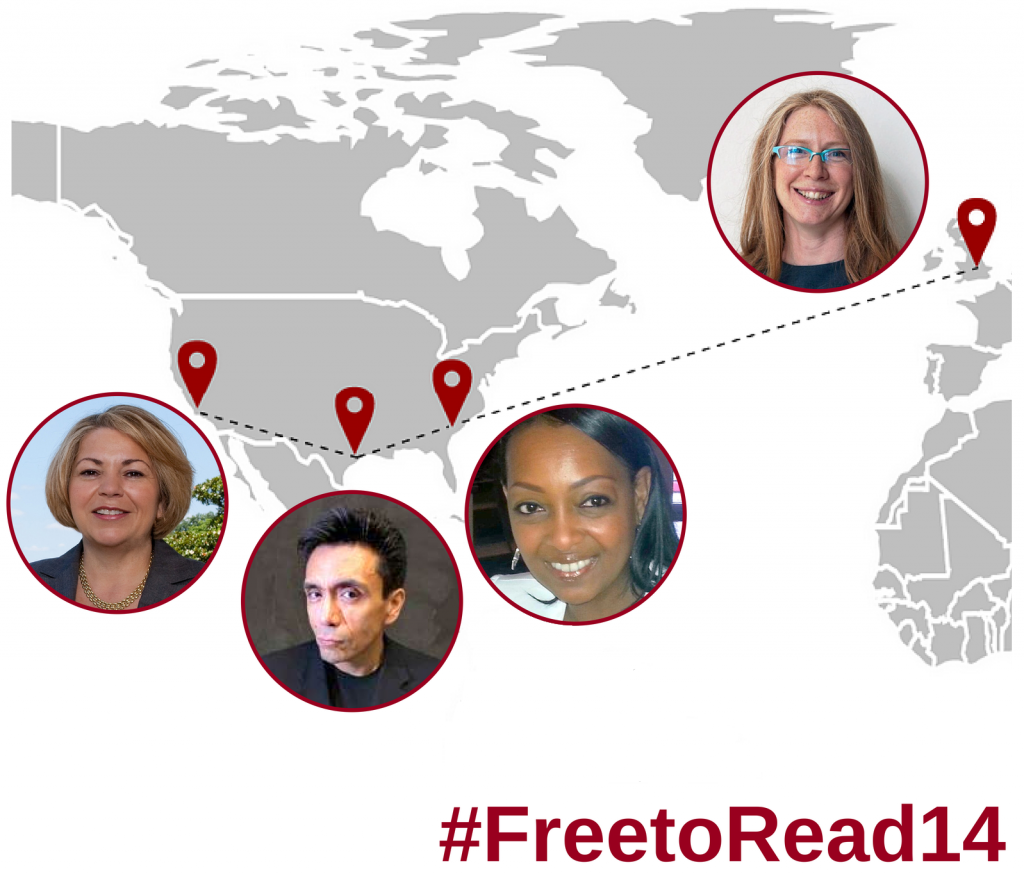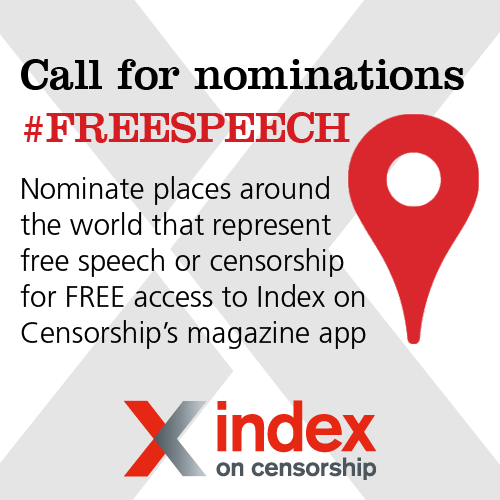19 Sep 2014 | Events

Wednesday, September 24, 9am PT/12pm ET/5pm BST
In 2013, there were 307 reported requests for books to be removed from America’s libraries, potentially putting those volumes out of reach of students, readers, and learners of all types. While every corner of the map faces unique issues related to library censorship, these issues also catalyze passionate freedom-to-read advocates dedicated to getting the books back on library shelves. In this one-hour webinar, we will “travel” from London, to South Carolina, to Texas, to California, to talk with three activists about the problems they face and their efforts to un-ban books as well as Congresswoman Linda Sanchez about why their efforts are so important.
London, UK: Jodie Ginsberg, CEO of Index on Censorship, will start us off by discussing issues faced outside of the U.S. and how Index chooses to respond.
Charleston, South Carolina: We will then travel to Charleston — where the graphic novel Fun Home: A Family Tragicomic by Alison Bechdel has been a flashpoint in a university funding controversy — to hear from Shelia Harrell-Roye, a committee member from Charleston Friends of the Library. With the 2014 Banned Books Week focus on graphic novels, Harrell-Roye will discuss what her group has been doing to support this critically acclaimed book.
Houston, Texas: Moving westward, we will travel to Houston to hear from Tony Diaz, author, radio host, and leader of El Librotraficante. Diaz is a champion for banned books and for ethnic studies textbooks in both Arizona and Texas.
This banned books journey will end in California where Congresswoman Linda Sánchez of the CA 38th District, will offer some closing remarks about why the freedom to read is so important for our nation’s future. Afterward, our very own Ed McBride will wrap up the conversation from Thousand Oaks, CA.
Wednesday, September 24, 9am PT/12pm ET/5pm BST
Registration is free, but spaces are limited. (Note: On the following screens you will be asked to set your timezone preferences, then click register on the third screen to reserve your spot.)
Planning to attend? Let your social space know about this important event using #FreetoRead14.
8 Sep 2014 | Magazine, News

We want to offer free access to Index on Censorship magazine’s ipad or iphone app from a symbolic place that represents freedom or censorship anywhere around the world – and we are calling on you to nominate your choice.
Suggest a symbolic place for censorship or freedom – from Speakers’ Corner in London to Egypt’s Tahrir Square – and if we opt for your suggestion, we will unlock the app so readers standing on that spot will get free access for one year.
Download the free taster app today here
What you need to do:
1) Pick a global location that’s associated with free speech or censorship
2) Tweet your nominated location to @Index_Magazine using hashtag #FREESPEECH before 30 September 2014. Follow @Index_Magazine if you are not already a follower.
3) Selected locations announced on 22 October 2014, with free access to Index on Censorship Magazine app immediately available for one year
* Winning locations picked by Index on Censorship magazine team
** Free app access available at winning locations until 1st September 2015
*** Information on the Index on Censorship magazine app here
2 Nov 2011 | Uncategorized
When science and free expression clash, it’s often a matter of public concern. The fallout from Professor David Nutt’s clash with the government was one of many topics tackled at a panel discussion at the British Academy on Monday night. As perhaps the most famous recent example of government rejection of scientific research, the furore over Professor Nutt’s findings about drug use exposed the disconnect between scientists’ presentation of data and government policy –– and, for those working in criminology, education or communications, the problems can be even greater.
The event, jointly organised by SAGE and the Academy, part of the ESRC Festival of Social Science, presented the panel with the question: “How can social scientists and government work together to strengthen public trust in scientific evidence?”
For Julian Huppert MP, this was a chance to challenge the belief that politics and science simply don’t mix. Unhappy with the way in which some politicians have shied away from attempts to place the work of social scientists at the heart of some of their own decision-making, he applauded the Conservative manifesto pledge to encourage MPs to attend a course in understanding science. Unfortunately, only a handful of politicians took part — and those who amounted to “crisis cases” within politics were nowhere to be seen.
Professor Anthony Heath also had some complaining to do: lamenting the fact that social scientists rely too often on “stylised”facts and selective use of events. Social scientists need to be aware of the difference between advocacy research and scientific research, he added.
For Imperial College academic and Guardian contributor Dr Alice Bell, who contributed to research for the BBC Trust’s review of impartiality in science reporting, there is a real need for social scientists to have their findings challenged, acknowledged and debated, not only in Westminster, but in the public arena: for this, the media is crucial — and the work of PR professionals should not be discounted.
How scientists communicate –– and what is hidden –– is explored in the forthcoming issue of Index on Censorship magazine, Dark matter: What’s science got to hide? The issue, published by SAGE, looks at how scientific data is digested, politicised or suppressed — whether it be the work of doctors, physicists or oceanographers. Fred Pearce, author of The Climate Files, is an advocate for data sharing, calling for an openness in scientific communities, particularly on the heels of the Climategate scandal at the University of East Anglia. Sense about Science‘s Tracey Brown laments the increasing pressures on scientists and stepped up attempts to silence their debate, not least due to the chilling effect of English libel law. The BMJ’s investigative editor Deborah Cohen looks at how keeping information about drugs trials out of the public domain can have disastrous results — here some trusted names in the drugs business come under scrutiny.
Elsewhere, in the United States, warnings over the dangers of deepwater drilling go ignored in a political environment that has led President Obama to disappoint those who had hoped for a more transparent approach to research. The ACLU’s Heather Weaver outlines the beguiling trajectory of the powerful creationist lobby and its impact on the US education system. And in China, the pollution politics at play paints a worrying future for some of the country’s population.
The issue is out on 28 November, with a launch of the magazine at Imperial College on 6 December. For more information about The Art Issue, available now, and to subscribe to the magazine, click here.


